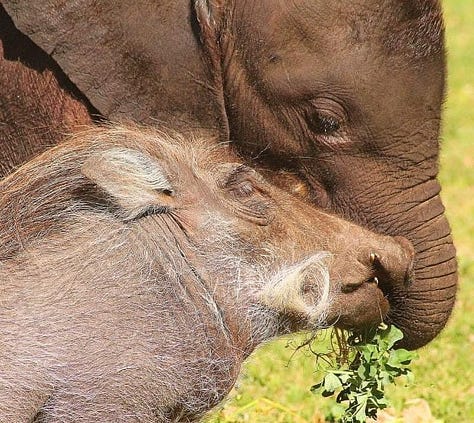
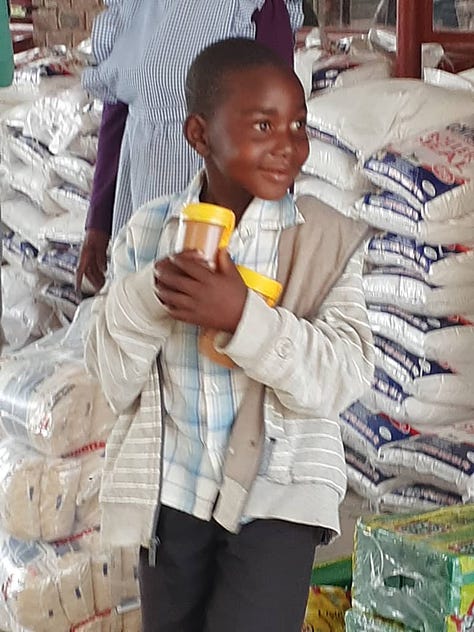

(Photos: images from Wild is Life/ZEN; ROKPA Support Network and Twala Trust: the charities supported by all paying subscribers of this new newletter)
Dear Subscribers,
Before diving into this week’s article and with the festive season upon us, for those having a hard time coming up with gifts for those difficult-to-buy-for people, I’d like to offer my traditional suggestion: how about gifting a subscription to this newsletter? You can gift for as little as one month, or a full year. Half of subscribers’ money goes to the charities we collectively support, so it really is a double gift!
As regular readers know, I often provide updates from our supported not-for-profits, to foster a sense of community. And to show how your subscription money really makes a big difference! So please do have a think about who may benefit from joining on our journey in the year ahead.
In partnership with Global Development Group (GDG) we now enable our supported Zimbabwean charities to collect funds directly and offer tax-deductible receipts to donors resident in USA, UK, Australia, New Zealand and the Netherlands. GDG is constantly working for compliance with the governments of other countries.
If you would like to donate personally, or via a company, please click to support (in alpha order):
R0KPA Support Network: helping some of the most disadvantaged people in Zimbabwe;
Twala Trust Animal Sanctuary: caring for dogs in rural Zimbabwe whose owners struggle to feed them;
Wild is Life/Zimbabwe Elephant Nursery: rescuing orphaned elephants and creating a sanctuary where they return to the wild. While a separate listing for Wild is Life/ZEN is still in development, if you want to donate now, and receive a tax deductible receipt dated before the year end, we will hold funds in The Michie Foundation for Wild is Life/ZEN until their listing goes live early next year.
You’ll find more about our initiative with GDG on our dashboard, click here.
Just a reminder: to ensure that your donation results in more than just a ‘one off’ material future benefit, always recollect bodhichitta when offering gifts, namely:
“By this act of generosity may I quickly attain enlightenment so that I may lead all other living beings to this state of definite bliss.”
And so, on with this weekend’s regular post which I hope you find helpful both in itself, and also in conjunction with last weekends post about karma.
Just so you know, I have also spent some this week working on a short story I will be sharing with you in time for Christmas. It’s called Wenceslas: the true story.
Stay tuned!

Attention! Where to place it for happiness
Years ago I heard the story about how a vulture, who had just flown over the African veldt, was asked what he had seen. “Several decaying carcasses,” he reported gleefully. “I’m flying back for a good feed right now.”
A bee, who had buzzed her way over exactly the same area was asked what she had seen. “The country is ablaze with flowers,” she reported. “Enough to fill the whole hive with honey.”
Most of the time, we are just like the vulture and the bee: we pay attention to a narrow band of what’s available out there, ignoring the rest. There may be all manner of possible objects to be experienced through the senses. Not to mention the limitless options of what we may choose to think about. But because of our conditioning, or karma, our attention tends to return to the same old things, time and again.
Just as the vulture and the bee must eat, our jobs and personal responsibilities may demand that we focus on specific things at least some of the time. Outside these demands, however, what we attend to is entirely up to us. Moment by moment we are making choices, even if we’re not always consciously aware that’s what we’re doing.
Most of us have spent plenty of sleepless nights giving attention to our personal dramas. Just as we know the glow that comes from focusing on happiness-inducing experiences. Or cute images like the ones at the top of this post! We may be aware that we have choices just as we understand the consequences of those choices. But like moths to a flame, we are frequently drawn to what burns us. Or we cede control of our attention to traditional or social media, whose agendas have nothing to do with our wellbeing.
My simple suggestion today is to invite you to check in with yourself during the day with the simple question: what am I paying attention to?
If your attention is in a place where it delivers fulfilment – great!
If not, acknowledge, accept and let go, before deliberately focusing on a source of wellbeing.
Recollecting our attention
Our challenge is not so much the doing of it as the remembering to do it. We get so caught up in cognitive chatter, especially negative mental tropes, that it can be useful to set up external stimuli to nudge us back to awareness:
Some people I know put alerts on their mobile devices so that at set, or random times of day, a ping or vibration invites the question: what am I attending to?
I personally have applied tiny, coloured stickers on frequently-seen items – the computer screen, watch strap, car dashboard – for the same purpose. Seeing them as you go about the day causes a momentary pause: what am I attending to?
You may like to mentally affix to that first sip of coffee or first bite of food, that visit to the toilet, stepping under the shower, or turning out the bedside light: what am I attending to?
In such a way, step by step, we cultivate a greater awareness of where our attention is focused. And deliberately shift it when necessary.
Where happiness lives
Where might we place our attention instead? Along with the carcasses or flowers in our lives (!) we can get into the habit of visiting places that bring us joy.
The present moment
Focusing on our senses, here and now, is a powerful antidote to too much thinking. Even something as basic as closing our eyes, taking a deep breath and mindfully exhaling helps dampen down mental chatter.
Neuroscientists tell us that we can’t simultaneously be in both ‘direct’ mode - the here and now - and ‘narrative’ mode - absorbed in thoughts. There is also a direct correlation between time spent in direct mode and feeling content.
Gratitude
To be grateful is to be happy. Buddha himself pointed to the extraordinary unlikeliness simply to be human, with the inclination and time to pursue transcendence. And when we consider the lives of the eight billion people with whom we share our world, most of us have cause for profound gratitude. To be born in countries where we are safe, enjoy certain rights and freedoms and have countless opportunities for personal advancement – what extraordinary good fortune is this!
Most of us have no shortage of reasons for gratitude that are personal and authentic. We can make it our habit to explore these, to return to them and elaborate on them. To remind ourselves of them - if we wish, to journal about them – until gratitude becomes a habit, one that increasingly pervades our thoughts, feelings and conversations.
How lucky are we? This is a useful mantra to cultivate each day.
Celebration
Taking delight in virtuous outcomes is another reliable source of wellbeing. Many conscientious, well-intentioned and somewhat intense people – and I’m guessing, dear subscriber, that you may very well fall into this category! - are as reliable at delivering positive outcomes as they are at failing to savour them. There’s always the next important thing to do, right?
But recollecting the good things and rejoicing in them isn’t only emotionally satisfying. It strengthens our inclination for more of the same.
Significantly, the good things needn’t be our own. Celebrating the virtuous activities of others also has the effect of making them part of who we are. Just as several pilot friends I’ve known my whole life built Airfix aircraft in their bedrooms when they were kids, when we take joy in something, even as a model, we empower a dynamic to experience the real thing.
Rejoicing in the virtue of others is powerful, karmically speaking. This is why part of a daily practice for many Buddhists is celebrating the attainments of those who have become enlightened. In the words of my kind guru Geshe Acharya Thubten Loden: “Rejoicing in the virtues of Buddhas and Bodhisattvas, we gain a tenth of the benefits they gained, because their level of development is so much greater than ours. Rejoicing is therefore a very profitable business! It takes no physical or mental effort, is very easy, yet brings great results.”
Love, compassion and bodhichitta
Love, defined as the wish to give other beings happiness, and compassion, which is the wish to free other beings from suffering, are two further states where wellbeing abides. Further qualities to cultivate as we seek to shift the balance of our thoughts away from the mud in the direction of transcendence.
This version of love is different from the conventional, worldly version of love which comes with strings attached. It is a philanthropic, unconditional, open-hearted wish for another being’s true happiness.
The ultimate manifestation of love and compassion in Tibetan Buddhism is bodhichitta – for the sake of others, the wish to attain enlightenment. As with gratitude and celebrating virtue, we train to recollect bodhichitta throughout each day so that it gradually moves from a hypothetical ideal to becoming our heartfelt and spontaneous motivation.
Attention as the tool for transformation
A metaphor of a rope I mentioned in last week’s post on karma resonated with some readers.
The rope represents our character, which is extremely difficult to change. But a rope usually consists of entwined cords – habitual patterns of cognition – and these in turn comprise many fine strands – individual thoughts – which are much easier to deal with. One at a time and in real time, we may acknowledge, accept, and let go of those thoughts that don’t serve us.
Today’s article offers the means by which to do this. By exercising control of our attention, we knowingly shift away from habitual negative preoccupations to happiness-creating causes. We weaken the choke-hold of ingrained patterns while deliberately creating new ones.
Attention itself is our tool for transformation. What we are in the habit of attending to becomes our reality.
I hope that short post helpful. Please feel free to share it if you know anyone who may benefit.
Most of you know of the extraordinary work done by our supported not-for-profit Twala Trust to help feed, provide vet support and care for the dogs of the rural poor in Goromonzi, Zimbabwe. But Twala also does wonderful things for cats too. I am delighted to share a few pics with you this week:
The one and only, the Boss, Supervisor of morning food prep, Chief Taster, Couch Potato, Head of the volunteer house - Gandalf!
Van Pelt the ginger, honorary member of the Waggly Tail Club (who go for walks each day) and comforter of old dogs. Who says that bodhicattvas only exist in fiction? How very dare they!
A different kind of specialness again - this is Marble, ‘mother’ of the Mittens - a group of vervet monkeys and kittens who arrived at Twala at the same time and formed the most unusual close bonds.
I just love the mysteriousness of cats! How wonderful that Twala offers a haven for those who would not otherwise survive.
If you find my posts helpful and would like to be an active part of our virtual, global community of people putting compassion in action, please ‘Subscribe.’ Every single subscriber is making a difference every day to the lives of others!




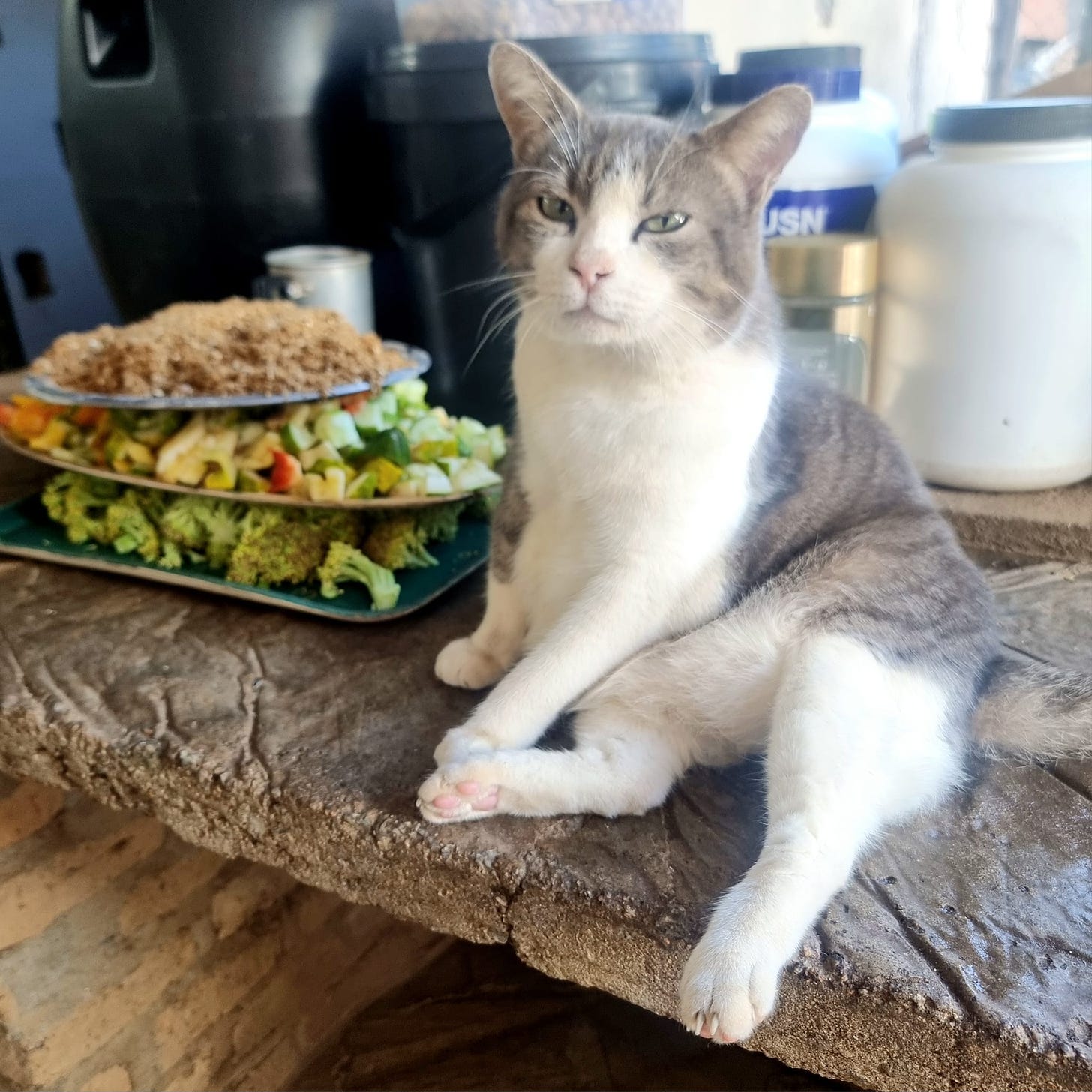
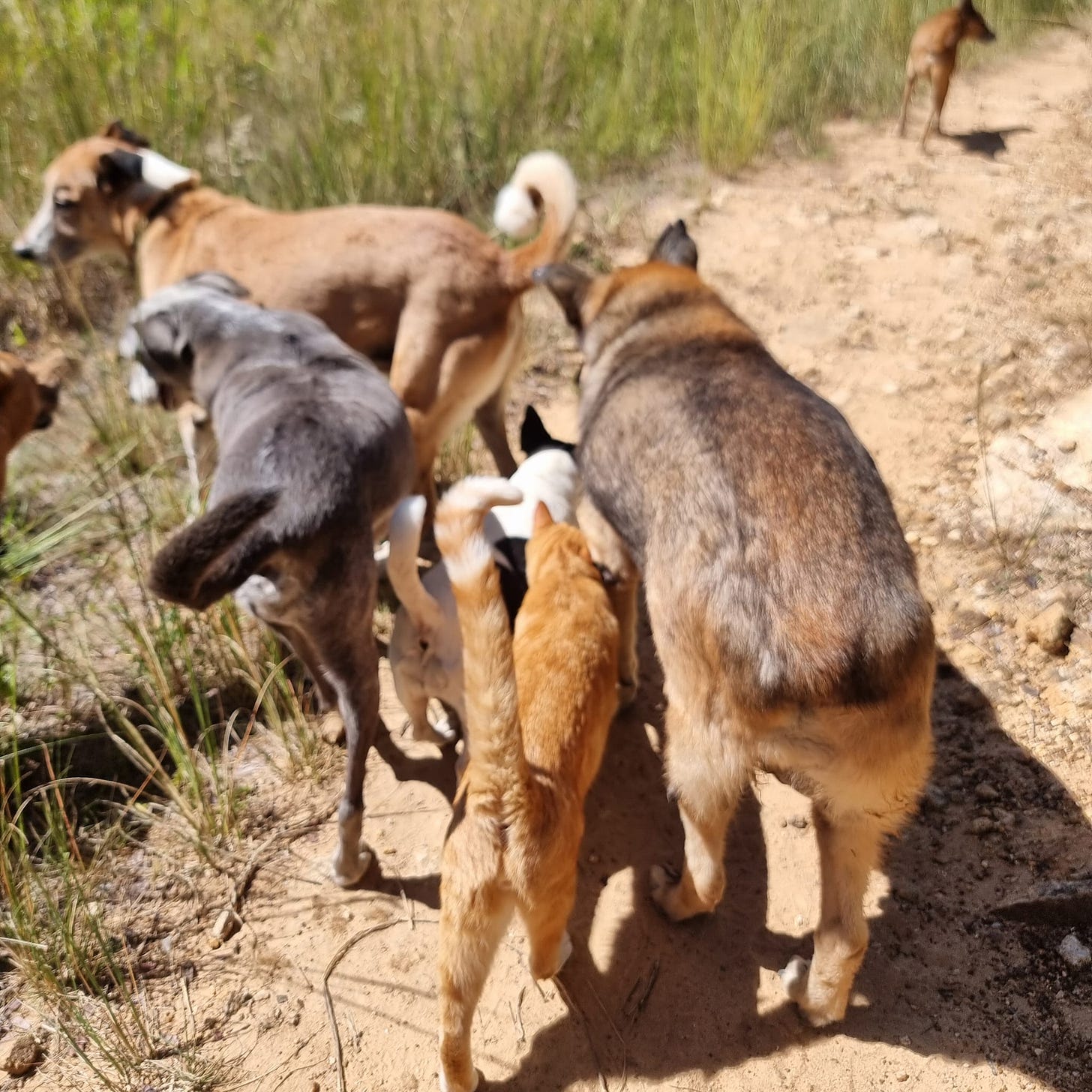
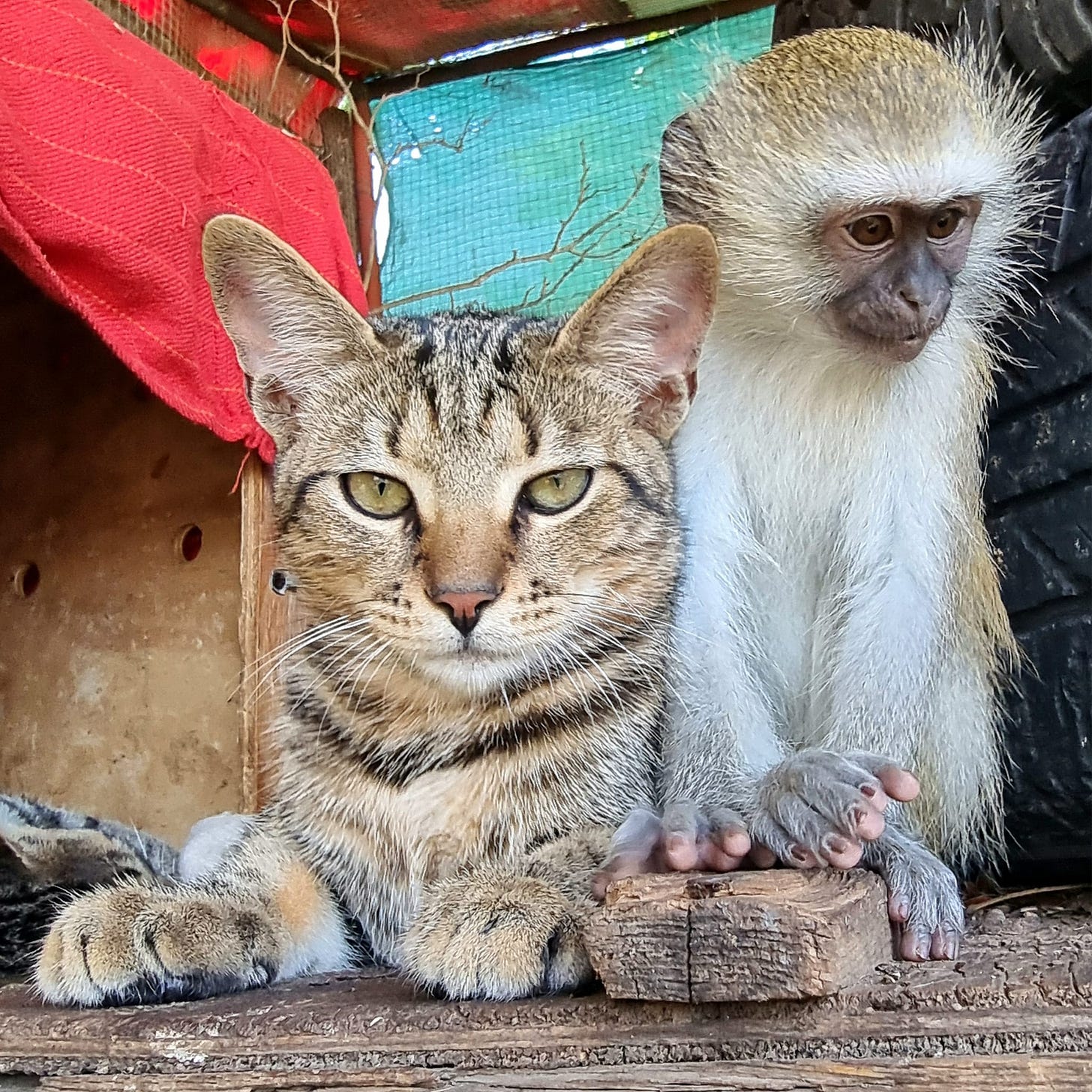
Such an important teaching containing many gems of wisdom, David. Thank you for being such a valuable source of kindness and support in my life. 🙏🏼💗
The vulture and the bee spurred me to look at some of my own landscape, what I attend and perhaps what may resonate with some others.
Working in rescue, seeing abuse & loss, caring for hospice animals, indeed, the countless many ways All of us experience heavy challenges, can, I think, be some of the most gripping ways we may lose sight of how best to be present.
It is not the absence of sad and difficult emotions, but acknowledging and letting them be or letting them go, in the face of what else is in view.
Like the vulture and the bee—We choose what we give attention and When.
What you say is Vital—a Ground upon which we can go out in the world and do what we do, while not being held captive by it.
We can all benefit and benefit those around us by Bodhichitta—seeing and aligning ourselves with all sentient beings for the sake of their enlightenment. And by rejoicing in the virtures of all sentient beings.
The cats of Twala you shared could not be more sweet!
Gandalf, the food-prep 🥙supervisor
Van Pelt-making sure the dogs 🐕 stay out of trouble on their walks
Marble-🐒 mom
David, Thank you for being a voice of wisdom and compassion. Blessings to those you support and for giving us the opportunity to help them.